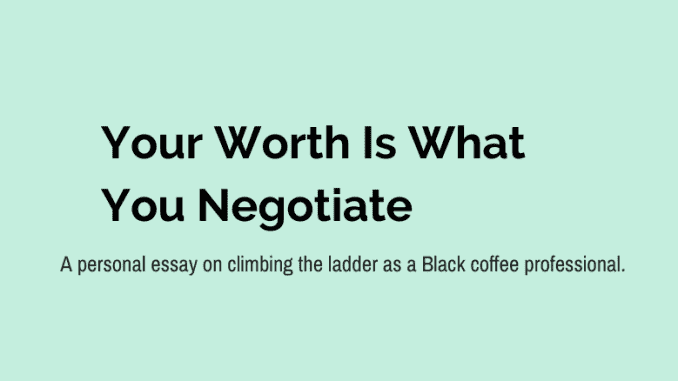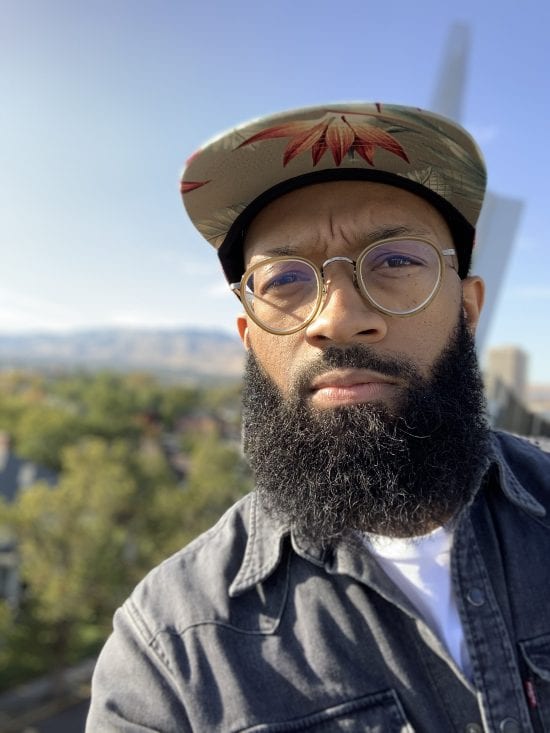
A personal account of moving up in the coffee industry as a Black coffee professional.
BY MIKE ROBINSON
SPECIAL TO BARISTA MAGAZINE ONLINE
I am a Black male teetering between being overqualified for some positions and under-qualified for most. I’ve labored for 10 years in the coffee industry with fleeting victories. After this time, I am back where I began, a humble barista happy to prepare a cappuccino with my version of a heart, yet wondering if this is a job of passion or convenience? I’ve experienced isolated job titles with increased responsibility that led to nowhere, and incremental wage increases that were too little, too late. There have been superficial opinions about what I do and what I’m worth. I am nearly burnt out.
Being a Black male in the coffee industry has been difficult. I’ve always downplayed any racial bias that might have been present, because on one hand, it is exhausting to victimize yourself and pull out the race card every time you feel slighted. On the other hand, it’s more optimistic to pretend the lack of opportunities directly correlate to your lack of effort. Black Americans specifically have learned that “your failures are your fault,” and your success is an extension of white endowment. After a few years of being a barista, I learned that it’s my responsibility to find a place in the coffee world that would really make me happy; with respect to all the highly talented baristas competitors, this was not something I wanted for myself. I wanted to pull back the curtain and see how the machines operate through roasting. Before I continue, there are so many roads I could have taken on this journey. I believe none is correct, and none is wrong.
In 2007, my first role in coffee was as a barista for a small Italian café owned by two 30-something-year-old white men, which eventually ended in a failed coup. The first thing I thought I should do was advance my title to show ambition, to put my work ethic in front of every perception strangers may have of me. I gave superlative customer service with a “customer is always right” attitude, and the entire time, I watched others get promoted before me and accepted insulting incremental raises. Things eventually got worse and the owners ended up selling the business.
This was the start of my coffee experience. In the years after I pursued short-term barista jobs, there was always a reason why a raise wasn’t feasible or advancement available, but I found ways to diversify my resume as much as I could. I worked as a barista for large European companies with North American installations. I taught what I knew for a temporary nonprofit program. I even got to roast coffee for a small respected local shop in Chicago while also managing higher responsibilities and making drinks too.
In my most recent experience, I delved further into production. I thought I would be exposed to a larger-scale roasting process, complete with sales, green coffee buying, tasting, equipment and packaging. To some degree I was a “wholesale specialist,” which was actually a fancy title for a glorified bag boy with a year of informal roasting experience and several years managing retail spaces. Imagine being a seasoned professional athlete but justifying how cool it is to be a towel boy because you have access to the locker room.
Now in 2020, I am yet again just a humble barista for a small, respected specialty-coffee brand, reimagining where I belong in the coffee industry, asking myself is it because I’m Black and we are not prioritized in terms of representation beyond actual production, or because I failed to take the proper path and shake the right hands? Both reasons are unacceptable for me. It is absolutely exhausting attempting to determine my worth as a Black man if the only measurements for doing so are how comfortable can I make white people in power feel around me, or how qualified am I if the title is only symbolic? I actually still do not have the answers; I do however have suggestions.
First, there should be no ambiguity about what roles and responsibilities exist in coffee. The roadmap is so unclear and different for many coffee professionals, how do we know the difference between being unqualified and being “unfit”? Furthermore, neither should matter. Our passion for coffee is expressed and amplified across coffee shops where Black baristas continue to make lattes and wonder why they see so few of themselves reflected in more prominent roles throughout the coffee world.
My hope is those who have answers and want to help will, in whatever their capacity, encourage a company culture of growth and development specifically for Black people. To hear their voices, observe their ambition, and extend a ladder for them. If there is no ladder, create one. In the Black community, we like to say … “I have the receipts!” We have the proof for how we’ve been treated, but we are here to stay, grow, and develop.

ABOUT THE AUTHOR
Mike Robinson is a proud Black barista with a decade of experience, originally from Chicago and relocated to the San Francisco Bay Area. Working in coffee has allowed him to showcase his personality and meet so many interesting folks. Mike enjoys the performative nature of it, and it’s a job where you don’t need to be normal, but no one expects that anyway.

